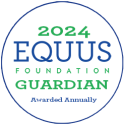Train to Facilitate
In order to become a facilitator for The Equus Effect, both civilians and veterans must have the following:
- First, a desire to serve veterans or other populations who would benefit from experiential learning and repatterning of current attitudes and behaviors.
- Second, the emotional maturity required to recognize and handle one’s own triggers in a responsible way, the curiosity to know oneself fully and the capacity to hold space for clients’ emotions: vulnerability, fear, anger, frustration, sadness and grief.
- Third, facilitators also need to know how to ask invitational questions rather than imposing their ideas or analyzing clients. The ability to ask permission is key.
- And, last, a depth of experience with horses as well as the willingness to learn a new way of being with them. All must be competent enough to handle emergencies as well as enough respect and appreciation to give program horses the space to participate as co-facilitators in this process.
The Equus Effect Program is both unique and valuable in terms of its ability to deliver effective and long-lasting benefits to veterans and other populations because:
- The content of this curriculum focuses on resilience tools and relationship skills that warriors, and others making their way from one life stage or culture to another, can use to establish healthy, authentic relationships within themselves as well as others with whom they live and work.
The practical, down-to-earth tools we teach are drawn from the following:
- Somatic Experiencing
- Eponaquest Worldwide
- Internal Family Systems
- The Masterson Method
- Polyvagal Theory
- Heartmath
- Karla McLaren
The opportunities we give clients to change their habitual ways of thinking, feeling and behaving are introduced and taught from the bottom up. From direct knowing through experience to learning through didactic presentation of materials, we offer participants the opportunity to discover for themselves what it is like to lead with their best selves. Our four-session curriculum also offers clients the opportunity to practice and report on how these changes have impacted their personal and professional lives.
Since this model is not a medical one but rather one that resembles a peer-to-peer approach. The Equus Effect focuses on moving past barriers and resistance to change through direct knowing and group learning. It is also important that both veteran and civilian facilitators appreciate the nature of their own triggers/resistances to new ways of being. Facilitators are encouraged to describe both their unique forms of resistance to change, and how this program has given them tools they need to free up and redirect their energy in more productive ways.
The model is characterized by an inclusive circle and a level playing field where facilitators are guides, but not experts on anything but their own inner process and the skillful means needed to evoke curiosity and compassion in clients.
“As from within, so without.”
Based on our experience over the years with this program, we believe that the curriculum itself, our deep understanding of these populations and the credibility we have now established with organizations with whom we collaborate, will provide new facilitators with the opportunity to enjoy ongoing success.
Our program is intended to complement ongoing treatment for trauma, addiction, counseling and professional support systems. To this end, we always try to introduce our principles and practices by offering an afternoon actual experience to clinicians and mental health providers who work with these populations.
We also ask that clients are in some form of inner exploration or counseling in order to anchor the insights gleaned from their experience with us. Our aim is to ensure that they continue their own journeys with the support of professionals in the healing arts.
We offer our training program on an individual scholarship basis to potential veteran facilitators who have the capacity to stay grounded and clear in the face of issues linked to military service and to function as both compassionate AND objective observers.
Benefits
Proven and Growing Success – We have seen well over 1000 veterans, first responders, crime victims, health workers, and many others in high stress situations .
We have created a program that ensures lasting results and complements the efforts of clinicians in a way that everyone involved feels successful and supported.
Deepen Community Connections – Not only does The Equus Effect program training enable you to work with veterans, first responders and health workers, the curriculum can broaden your reach into other populations in your community who work in highly responsible professions or services: teachers, students, parents, clinicians, caregivers … we believe that the personal and professional applications are endless. So, in addition to developing proficiency at delivering our program, it is essential that prospective facilitators also have an understanding of the populations they intend to serve.
Enhance Work with Currently Served Populations – The application to any of the populations you already reach will most certainly be enhanced by the tools we offer.
Our Approach to Training
We are serious about the structure of our four-session curriculum and know that it works.
We also know that results are long lasting and that we can provide potential facilitators with the tools they need (Facilitator’s Guide and ongoing support) to make graduates and the program successful for the veterans and others with whom they work.
To make sure that the investment is worthwhile however, we require prospective facilitators to participate in both of our weekend workshops called Inside The Equus Effect Parts I & II to determine how well this material resonates with each potential facilitator or team. We also take this opportunity to learn more about each person in the group and assess whether or not our approach is a good fit for The Equus Effect. See Inside The Equus Effect page for full description.
Skill Development Benefits of This Training
In addition to providing a safe and supportive environment, we understand that working with veterans, and others who have led (or do lead) lives that involve direct or secondary trauma, requires the following:
- A deep understanding of the difference between facilitating and teaching
- Awareness of the nuanced support role you need to play in the ‘journey home’ for people who have been in combat or other high-stress environments
- Awareness of the nuanced support role you need to play in the ‘journey home’ for people who have been in combat or other high-stress environments
- Foundational understanding of Somatic Experiencing© work which we provide. Somatic Experiencing (SE) is a client-centered, body-based approach to helping veterans and others resolve issues that remain following various types of trauma and stress. Working with horses and learning how to manage one’s emotions offers trauma survivors the opportunity to experience new ways of viewing themselves, their life situations and their ways of handling current situations
- Willingness to work with your own blind spots that can keep you from holding the appropriate space for clients around regulating their physical, emotional and mental energy
- Ability to step back and allow clients to make their own meaning out of experiences. This is a skill and art based on self-awareness, listening and knowing how to ask sensory-based invitational questions … all of which we model and teach.
The Equus Effect Full Training Program offers the opportunity for graduates to gain a tremendous amount of knowledge and insight, as well as access to these keys to long-lasting change for veterans, and other populations … including themselves. Our aim is to empower clients to become more resilient and develop a capacity for managing their own mental and emotional energy.
Facilitator Certification runs annually and begins with the two prerequisite weekends, Inside The Equus Effect Parts I & II in the spring and summer. See descriptions on these workshops.
The Equus Effect Academy Pricing, Application, Information & Schedule
The Equus Effect Academy Full Training is an online four-module curriculum which includes three on-site weekends. There are two pre-requisite weekends (see below).
PRICING:
Prerequisite weekends Inside The Equus Effect Part I & II are $900 each = $1800
Checks are required to book.
Full Training Academy = $6000
Each module is $1500 — pay before each module
Total: $7800 each
NOTE: The first 1-1/3 year there is full access to online Learning Academy. After that, there is a subscription fee of $150. The Resources Library is updated bi-monthly with new material bi-monthly.
If you’d like to Download the Application, please do so — fill out and email back to Training@TheEquusEffect.org and we will be in touch with you within 24 hours. Also feel free to call Kelly at (203) 613-1107 with any questions.
PAYMENTS:
We require payment up front for the weekends to reserve space. Payment by way of check is ideal for us due to processor fees with credit cards. However, if you do need to use a credit card, please email Donna@TheEquusEffect.org to set up a time to take your payment over the phone.
Please mail your check to:
The Equus Effect
Attn: Donna Larocque
37 Drum Road
Sharon, CT 06069
Contact Us
If you are interested in learning more, please email Training@TheEquusEffect.org or call Kelly Hitt (203) 613-1107.
Graduate Testimonials
You can also talk to graduate facilitators who are now delivering the curriculum. They can offer firsthand insight into the challenges and opportunities for personal and professional growth offered by the experience of taking the training and delivering this program.
Please see our Certified Facilitator Page.
Quotes from Graduates of The Equus Effect Training Program
Are you interested in helping us?
DIRECTIONS
IMPORTANT!
Navigation apps do not work to our street address!!!
SET GPS to Sharon Town Beach, Mudge Pond Rd., Sharon, CT.
Drum Road is a Y-intersection directly across from entrance to the beach.
The facility is about 3/4 mile on the left.
Park in front of the red barn on the left or on the far side of the red cottage on the left.
NOTE: Please do not park or turn around in driveways on the right side of the road.
The Equus Effect
Address
37 Drum Road, Sharon, CT 06069
For general information:
Kelly Hitt
Communications &
Outreach Director
Kelly@TheEquusEffect.org
(203) 613-1107
Jane Strong, SEP, IFS Trained
Executive Director
Co-founder, Lead Facilitator
(860) 364-9985
David Sonatore, LCSW
Program Director
Co-founder, Lead Facilitator
(347) 439-1777



